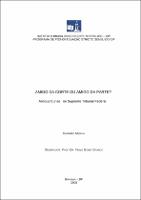Use este identificador para citar ou linkar para este item:
https://repositorio.idp.edu.br//handle/123456789/3919| Título: | Amigo da corte ou amigo da parte? Amicus Curiae no Supremo Tribunal Federal |
| Autor(es): | Medina, Damares |
| Orientador(es): | Branco, Paulo Gonet |
| Palavras-chave: | Jurisdição constitucional;Supremo Tribunal Federal;Amicus curiae;Decisão judicial |
| Data de submissão: | 2022 |
| Citação: | MEDINA, Damares. Amigo da corte ou amigo da parte? Amicus Curiae no Supremo Tribunal Federal. 2022. 214 f. Dissertação (Mestrado Acadêmico em Direito Constitucional). – Instituto Brasiliense de Direito Público, Brasília-DF, 2008. |
| Resumo: | O presente trabalho analisa a influência do amicus curiae no processo de
tomada de decisão no Supremo Tribunal Federal do Brasil. O ponto de partida foi o
debate acadêmico e inúmeros estudos empíricos acerca do processo de ingresso do
amicus curiae na Suprema Corte dos Estados Unidos e no Supremo Tribunal
Federal do Brasil. A experiência brasileira foi analisada a partir de exaustiva
pesquisa empírica que compreendeu o exame dos processos do STF relevantes
para o estudo. Os resultados encontrados sugerem que o ingresso do amicus curiae
contribui positivamente para o aumento das alternativas interpretativas ao promover
uma abertura procedimental e pluralização da jurisdição constitucional. Contudo, a
utilização polarizada do instrumento também pode resultar em um desequilíbrio
informacional, aumentando a distribuição assimétrica de informações entre as partes
envolvidas no processo. Em ordem de evitar tais conseqüências negativas, poderão
ser adotados mecanismos de disclosure como o procedimento eletrônico e as
audiências públicas. |
| Abstract: | This study sought to identify the influence of amicus curiae in the process of decision-making by the Supremo Tribunal Federal of Brazil (STF). To that end, we have checked quotations in the doctrine about the process of admission of amicus curiae in the Supreme Court of the United States and compared them to same process in the Supremo Tribunal Federal of Brazil. In an empirical research, we have analyzed the results of the process of STF with and without the role of the amicus curiae. As a result, we have found out that the amicus curiae have influenced the decision-making process in the STF, assuming litigant profile, in contrast to neutral and the impartial one that characterizes the tool in its ancient roots. That fact has increased the chances of success of those who depend on it. The conclusion is: the admission of amicus curiae contributes positively to the rise of alternative interpretations of the decision-making process. It enhances also the opening of the procedural constitutional jurisdiction, pluralizing it. However, the advent of litigating amicus curiae may contribute negatively to the informational imbalance of the process, increasing the asymmetric distribution of information between all parties involved in the decision-making process. In order to minimize the negative effect of the entrance of polarized amicus curiae, the parties should make efforts to rebalance the game information. The adoption of disclosure mechanisms shall allow the broad knowledge of all information given by the amici curiae. Doing that, any informational deficit caused by the entrance of a third party will be reduced. Among the possible measures for disclosure, we would like to suggest the the electronic procedural and public hearings. |
| URI: | https://repositorio.idp.edu.br//handle/123456789/3919 |
| Aparece nas coleções: | Mestrado Acadêmico em Direito Constitucional |
Arquivos associados a este item:
| Arquivo | Descrição | Tamanho | Formato | |
|---|---|---|---|---|
| DISSERTAÇÃO_DamaresMedina_Mestrado_2008.pdf | 1.18 MB | Adobe PDF |  Visualizar/Abrir |
Os itens no repositório estão protegidos por copyright, com todos os direitos reservados, salvo quando é indicado o contrário.
